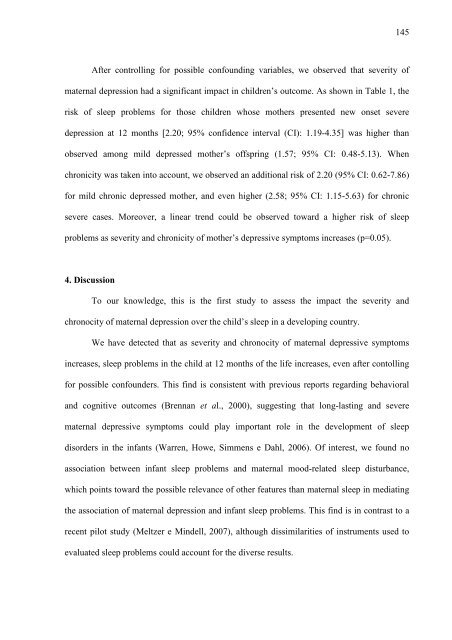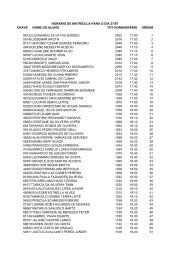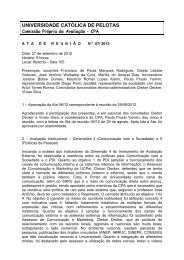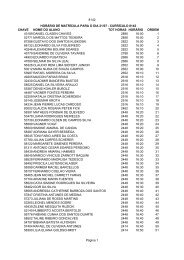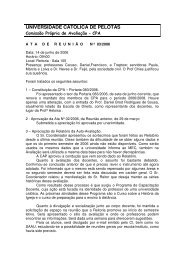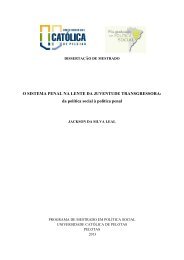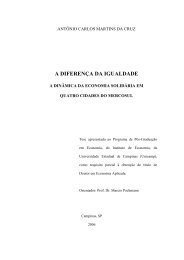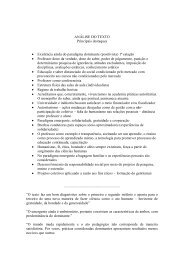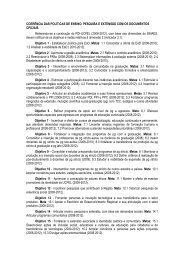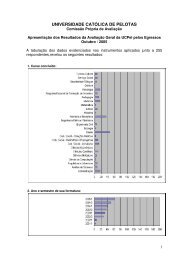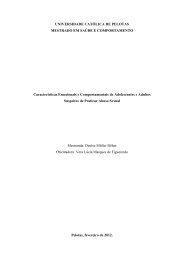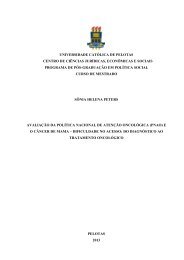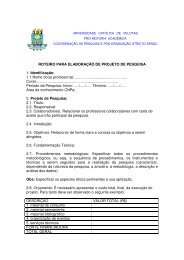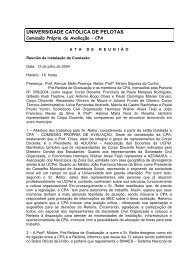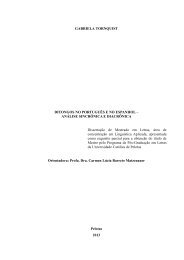Karen Amaral Tavares Pinheiro - Universidade Católica de Pelotas
Karen Amaral Tavares Pinheiro - Universidade Católica de Pelotas
Karen Amaral Tavares Pinheiro - Universidade Católica de Pelotas
Create successful ePaper yourself
Turn your PDF publications into a flip-book with our unique Google optimized e-Paper software.
145<br />
After controlling for possible confounding variables, we observed that severity of<br />
maternal <strong>de</strong>pression had a significant impact in children’s outcome. As shown in Table 1, the<br />
risk of sleep problems for those children whose mothers presented new onset severe<br />
<strong>de</strong>pression at 12 months [2.20; 95% confi<strong>de</strong>nce interval (CI): 1.19-4.35] was higher than<br />
observed among mild <strong>de</strong>pressed mother’s offspring (1.57; 95% CI: 0.48-5.13). When<br />
chronicity was taken into account, we observed an additional risk of 2.20 (95% CI: 0.62-7.86)<br />
for mild chronic <strong>de</strong>pressed mother, and even higher (2.58; 95% CI: 1.15-5.63) for chronic<br />
severe cases. Moreover, a linear trend could be observed toward a higher risk of sleep<br />
problems as severity and chronicity of mother’s <strong>de</strong>pressive symptoms increases (p=0.05).<br />
4. Discussion<br />
To our knowledge, this is the first study to assess the impact the severity and<br />
chronocity of maternal <strong>de</strong>pression over the child’s sleep in a <strong>de</strong>veloping country.<br />
We have <strong>de</strong>tected that as severity and chronocity of maternal <strong>de</strong>pressive symptoms<br />
increases, sleep problems in the child at 12 months of the life increases, even after contolling<br />
for possible confoun<strong>de</strong>rs. This find is consistent with previous reports regarding behavioral<br />
and cognitive outcomes (Brennan et al., 2000), suggesting that long-lasting and severe<br />
maternal <strong>de</strong>pressive symptoms could play important role in the <strong>de</strong>velopment of sleep<br />
disor<strong>de</strong>rs in the infants (Warren, Howe, Simmens e Dahl, 2006). Of interest, we found no<br />
association between infant sleep problems and maternal mood-related sleep disturbance,<br />
which points toward the possible relevance of other features than maternal sleep in mediating<br />
the association of maternal <strong>de</strong>pression and infant sleep problems. This find is in contrast to a<br />
recent pilot study (Meltzer e Min<strong>de</strong>ll, 2007), although dissimilarities of instruments used to<br />
evaluated sleep problems could account for the diverse results.


